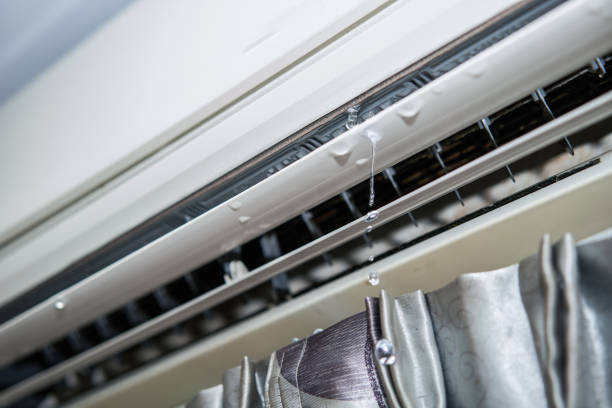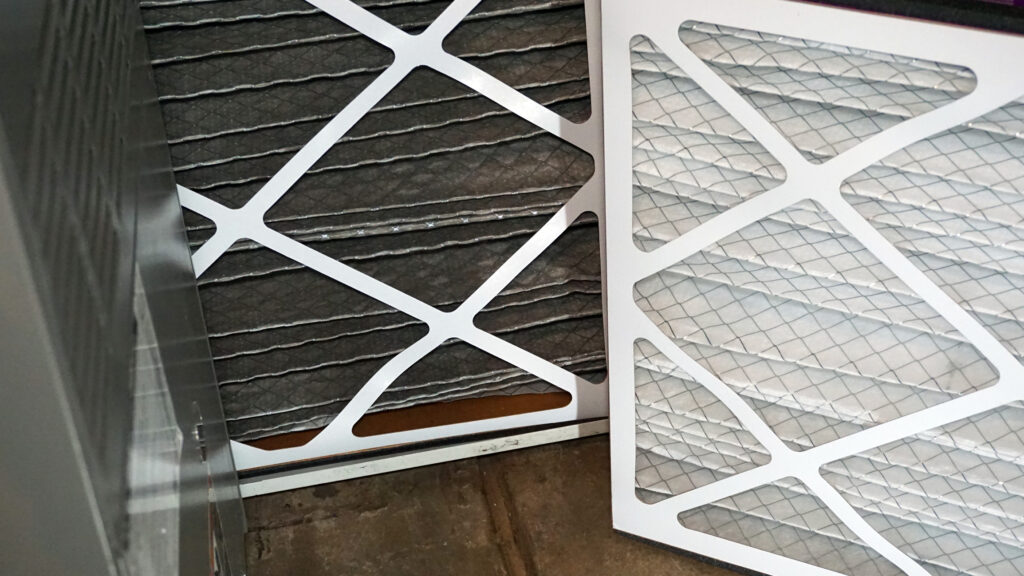Are you frustrated with your air conditioner because it’s leaking water? Beyond the frustration, you might also wonder if you have more than a nuisance on your hands. A persistently leaky AC unit isn’t normal. It’s a sign that something is wrong and needs the attention of an HVAC technician right away.
At Santa Fe Heating & Air, we know you rely on your cooling system to keep you comfortable indoors when outdoor temperatures soar. Our team wants to help you get to the bottom of your AC’s water leak. Keep reading to learn more about the common causes of leaky AC units and what steps to take next.

What Causes an AC to Leak Water?
Your AC unit removes humidity from the air as it cools your home. During this process, condensation forms. This condensation is collected in a drain pan, and a condensate line then removes it outside the house. As a result, you might notice small amounts of water dripping from your home’s outside unit. This is normal. However, you should never see a puddle of water around the AC’s indoor unit. If this occurs, you might have one of the following problems.
Clogged Condensate Drain Line
The most common cause of an AC leaking water is a clogged condensate drain line. This happens when a blockage occurs in the line. Things like dust, dirt, mold, and even algae can cause these blockages. After a clog forms, the water must go somewhere and typically backs up into the drain pan. If the pan overflows, water will leak onto the floor.
Frozen Evaporator Coils
The second most common cause of a leaky AC is a frozen evaporator coil. This coil is responsible for cooling the air. Sometimes the coil can freeze when air circulation is inadequate. This can happen for a few reasons, but dirty air filters and low refrigerant levels are the most common causes. After the coil thaws, which it eventually does, the melting ice produces more water than the drain pan can hold, and it then overflows, creating a leak.
Low Refrigerant
Most people believe air conditioners cool the air, but this is not exactly true. Air conditioners simply remove heat from the air using a refrigerant. A system with low refrigerant levels will cause the pressure inside the system to drop. When this happens, the evaporator coils freeze over, leading to an AC that leaks water. If you suspect you have a refrigerant leak, call a technician for AC repair. Never try to fix this problem yourself, as refrigerant is a chemical that requires careful handling.
Things You Can Check Before Calling a Technician
While it’s never recommended to attempt AC repair yourself, you can check a few things before calling for repairs. These checks help technicians diagnose the problem faster.
- Replace a dirty air filter
- Inspect the condensate line for visible clogs
- Look for ice buildup on the evaporator coils
How to Prevent Future Leaks
Preventing an air conditioner water leak saves you money and helps you avoid costly damage. The number one way to prevent most AC problems, including leaks, is to schedule preventive maintenance. HVAC companies, like ours, that offer comprehensive maintenance plans can catch small problems like low refrigerant levels and clogged condensate lines before they turn into major expenses. We also ensure all components are working well for optimal performance.
If you notice an AC leaking water, don’t wait. Call in the experts as soon as possible. Santa Fe Heating & Air provides fast and reliable AC repair services to diagnose and fix the problem quickly. Our top-notch team has the skills and equipment to handle everything from a simple condensate line clog to AC replacement if your unit is beyond repair. We understand the urgency of a leaky air conditioner, and our team is dedicated to restoring your comfort with a professional solution.
Why Santa Fe Heating & Air Is the One to Call
Don’t wait for a small leak to become a big problem. We offer a full range of services, including expert air conditioning maintenance, to keep your system running smoothly. Whether you need a simple inspection or a complex repair, our team is ready to help. For more information or to schedule an appointment, contact Santa Fe Heating & Air today!






